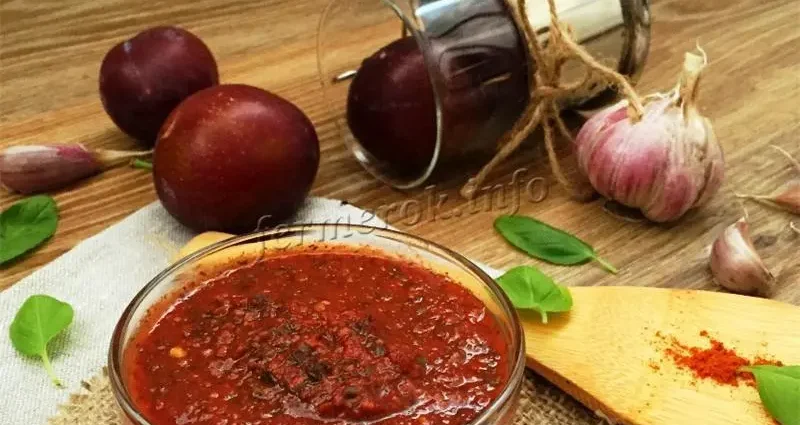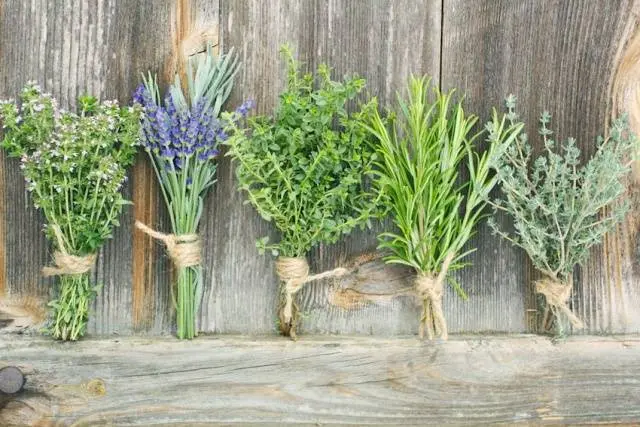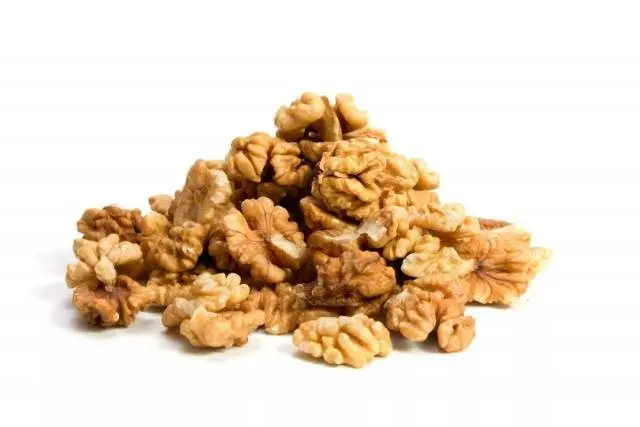Contents
Plum is suitable not only for jams, marshmallows and compotes, but also for the preparation of a completely unsweetened preparation – adjika, a condiment invented by the Caucasian peoples.
Its base is pepper, garlic and aromatic herbs. To soften the spicy taste of seasonings, they came up with the idea of adding various vegetables in the middle lane: tomatoes, bell peppers, pumpkin, zucchini. And you will already get sauce, vegetable caviar and seasoning in one dish.
The idea of preparing plum adjika originates from tkemali, a Georgian sauce based on plums. A wonderful symbiosis of 2 recipes resulted in a completely new one with an unusual taste. At the same time, its sharpness and taste nuances can be changed by adding different vegetables, spices, herbs, changing their quantity.
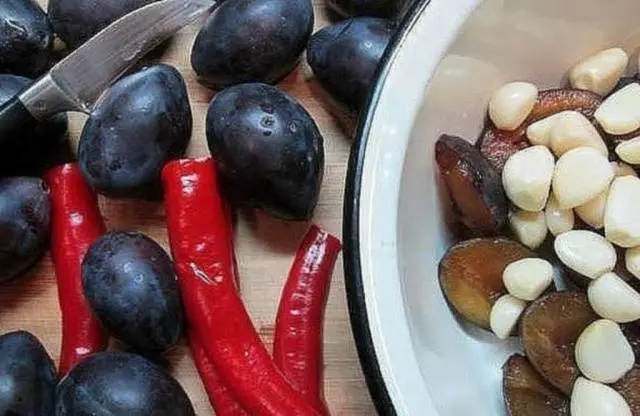
Plum adjika recipes
Plum adjika recipes are simple, versatile, they allow you to make preparations for the winter, which are stored in the apartment and will always help out the hostess, give the usual winter dishes a new taste.
Recipe 1 (basic)
What will be required:
- Prunes – 1 kg;
- Garlic – 0,1 kg;
- Hot pepper – 0,1 kg;
- Table salt – 1 tbsp. l.;
- Tomato paste – 2 tbsp. l .;
- Sugar – 1/2 tbsp.;
- Salt – 1 tbsp l.
How to cook:
- Prunes are washed, pitted.
- Peppers are washed, seeds are removed to prevent excessive spiciness.
- Prunes, peppers and garlic cloves are crushed with a meat grinder, boiled for about half an hour.
- Then garlic, hot pepper, tomato paste, sugar and salt are added. Wait for boiling and boil for another 10-15 minutes.
- The hot mass is laid out in jars prepared in advance, clogged, turned over, covered with a blanket for further gradual cooling.
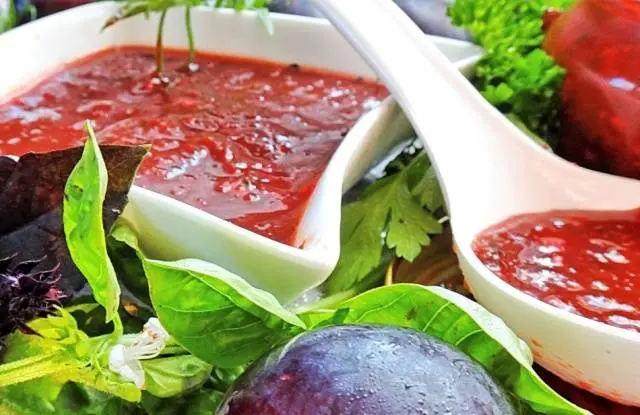
This recipe for adjika with plums is basic. It can be varied with other ingredients and spices. Get new types of adjika.
Recipe 2 (with bell pepper)
What will be required:
- Bulgarian pepper – 0,5 kg;
- Prunes – 2 kg;
- Garlic – 0,2 kg;
- Hot pepper – 0,1 kg;
- Spicy herbs (cilantro, dill, parsley) – to taste and desire;

- Salt – 3 tbsp l .;
- Granulated sugar – 0,2 kg;
- Cumin – half 1 tsp. optional;
- Tomato paste – 2 tbsp. l.
How to cook:
- Prunes, herbs, peppers are washed and dried. Plums are pitted, peppers are de-seeded.
- Vegetables, prunes and garlic are ground in a meat grinder.
- They put it on to cook. Bring to a boil and boil over medium heat for half an hour.
- Then add chopped garlic, chopped herbs, tomato paste, salt and sugar. Bring to a boil and continue cooking for another quarter of an hour.
- The hot mass is laid out in jars, pre-washed and sterilized. Cork, put on the lid and cover with a blanket.
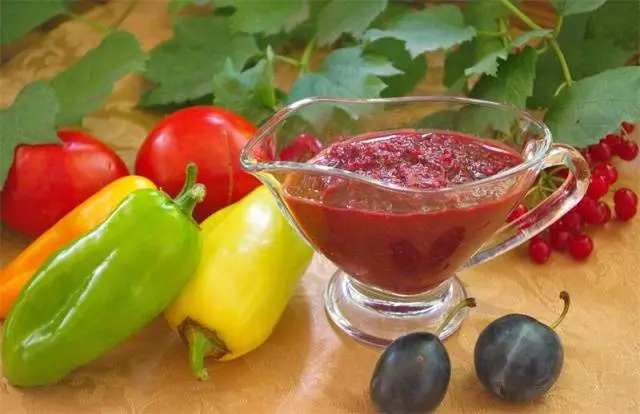
Spicy adjika from plums for the winter is always possible. It can be served with meat, fish and other second courses.
Watch the video recipe:
Recipe 3 (with apples)
What will be required:
- Prunes – 2 kg;
- Apples – 0,5 kg;
- Garlic – 0,2 kg;
- Tomatoes – 1 kg;
- Bulgarian pepper – 0,5 kg;
- Salt – 2 tbsp. l.;
- Sugar – 0 kg;
- Hot pepper – 0,1 kg;
- Onions – 0,5 kg.
How to cook:
- The washed prunes are freed from the pits.
- Tomatoes are washed and peeled.
- Peppers, apples are washed, seeds are removed.
- Garlic is peeled.
- Apples, prunes, vegetables, garlic are crushed in a meat grinder.
- Put to cook for 1 hour.
- Then add the garlic and cook for another 30 minutes. Cooking time may be longer. If you want to get a thicker mass.
- Hot adjika is laid out in jars, corked and placed under a blanket to cool.
Plum adjika with apples is well stored in the apartment. It can be served as a sauce for second courses, used instead of ketchup for pizza, stew meat or chicken.
Recipe 4 (with quince)
What will be required:
- Plum – 2 kg;
- Quince – 1 kg;
- Beets – 2 medium size;
- Table salt – to taste;
- Sugar – to taste;
- Garlic – 0,3 kg.
How to cook:
- Plum and quince are washed. Bones are removed from the plum, the quince is cut into slices, cutting out the seeds.
- Beets are washed, peeled, cut into pieces for easy feeding into a meat grinder.
- The garlic is cleaned.
- Plum, quince, beets are crushed in a meat grinder and boiled for 40-50 minutes.
- Then crush the garlic and add it along with salt and sugar at the end of cooking. Again they are waiting for boiling, boil for another 10 minutes.
- Lay out in ready-made jars.
In the recipe for adjika from plums, quince does not play a solo part, but, when combined with other components, it loses its astringency and brings new flavors that are different from other plum adjika recipes.
Recipe 5 (from yellow plums)
What will be required:
- Bulgarian pepper – 1 kg;
- Onions – 0,5 kg;
- Carrots – 0,5 kg;
- Yellow plum – 1 kg;
- Bitter pepper – 0,1-0,2 kg;
- Salt – to taste;
- Sugar – to taste;
- Sunflower oil – 1 tbsp.
- Acetic acid 9% – 2 tbsp.
How to cook:
- Plums and vegetables are washed, seeds are removed from peppers, seeds are removed from plums.
- Cut everything into small pieces, lay in a container and simmer over low heat until tender (30-40 minutes).
- Then the mass is crushed with a blender or with a meat grinder.
- Salt, sugar, oil, vinegar are added, everything is warmed up again. The hot mass is laid out in jars, pre-washed and sterilized.
- You can go another way of cooking: chop raw vegetables and plums. And then cook.
Adjika from yellow plums is more like vegetable caviar. The less intense taste of yellow plums is played here, which differs from prunes. The workpiece will be different in color, it will not be so bright.
Recipe 6 (tkemali)
What will be required:
- Plum – 3 kg;
- Dill – to taste;
- cilantro – to taste;
- Parsley – to taste;
- Salt – 4 tbsp. l.;
- Sugar sand – 6 tbsp. l.; Garlic – 0,1-0,2 kg
- Sunflower oil – 100 g;
- Apple cider vinegar – 2 tbsp. l.;
- Hot pepper – to taste.
How to cook:
- Plums are washed, freed from stones, covered with salt, mixed so that they give juice.
- Put to cook on a slow fire for a quarter of an hour.
- Grind with a blender or meat grinder.
- Chopped aromatic herbs, chopped garlic and pepper are added. And boil for another half an hour. In order for the workpiece to be successfully preserved until winter, the mass is boiled for an hour longer.
- At the end of cooking, add 9% acetic acid (2 tablespoons) or apple cider vinegar to adjika.
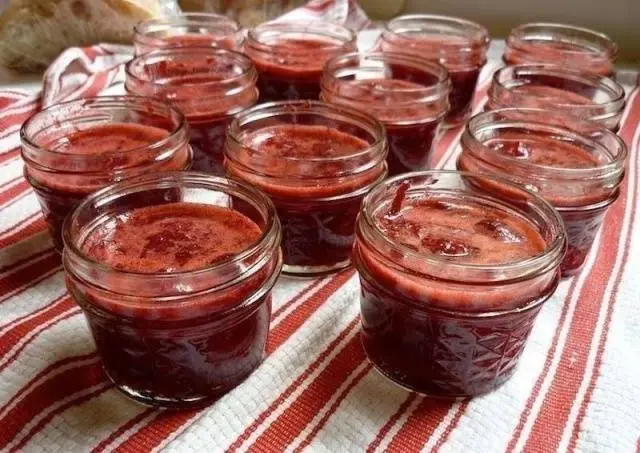
The hot mass is laid out in prepared (pre-washed with soda and sterilized in any way) jars. Close with metal lids, turn on the lid, cover with a blanket, allow to cool slowly.
The recipe for adjika tkemali from plums for the winter is adapted for conditions. Prepared from available products. Quite appropriate in the recipes will be: ginger, mint, fenugreek, suneli hops, other spices and aromatic herbs. Experiment, each time you can get a completely different flavor bouquet.
Recipe 7 (with walnuts)
What will be required:
- Bulgarian pepper – 1 kg;
- Walnuts – 0,3 kg;

- Prunes – 3 kg;
- Garlic – 0,2 kg;
- Black pepper – to taste;
- Salt – to taste
- Granulated sugar – half a glass.
How to cook:
- Paprika and prunes are washed and freed from seeds and seeds.
- Grind in a meat grinder and boil over medium heat for 40-50 minutes.
- The nuts are crushed through a meat grinder or a rolling pin, added to the boiling mass along with salt, sugar and ground black pepper.
- Once again bring to a boil, cook for 5-10 minutes, roll up in jars.
The combination with walnuts is unusual. Adjika can be used as a snack.
Conclusion
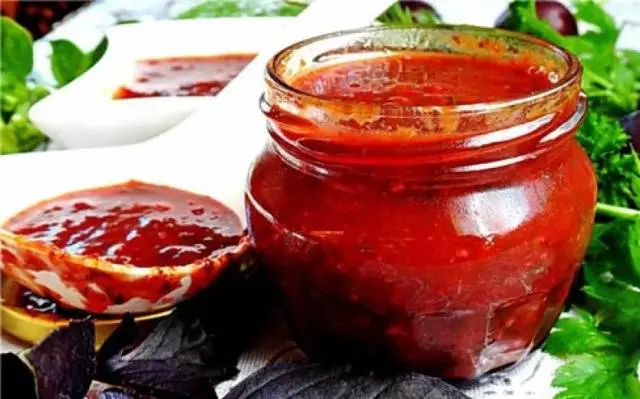
Plum adjika for the winter is easy to prepare, it implies many cooking options with different ingredients and spices. Spend about an hour to have a fragrant sweet and sour sauce available all winter, applicable to almost all dishes.










